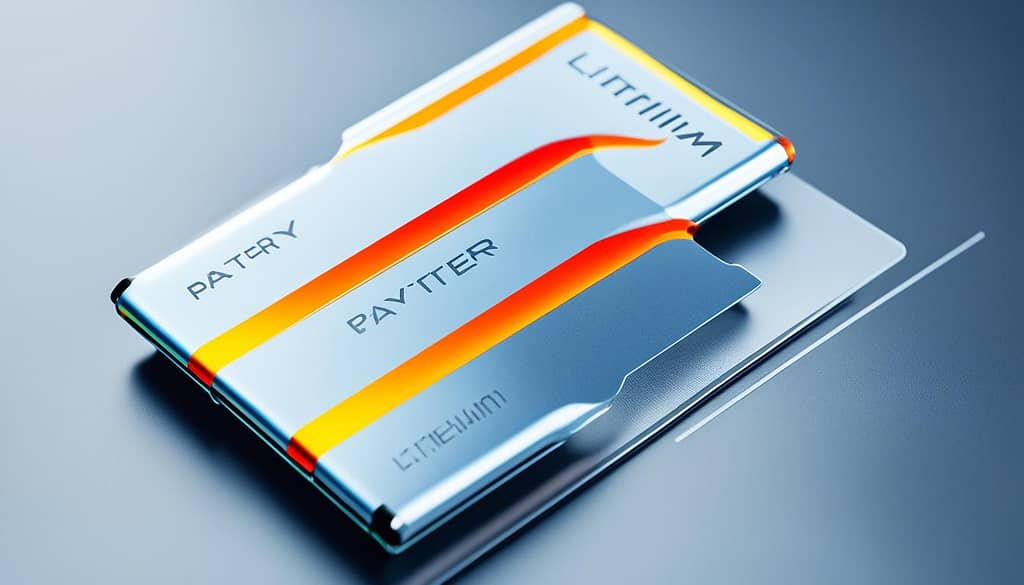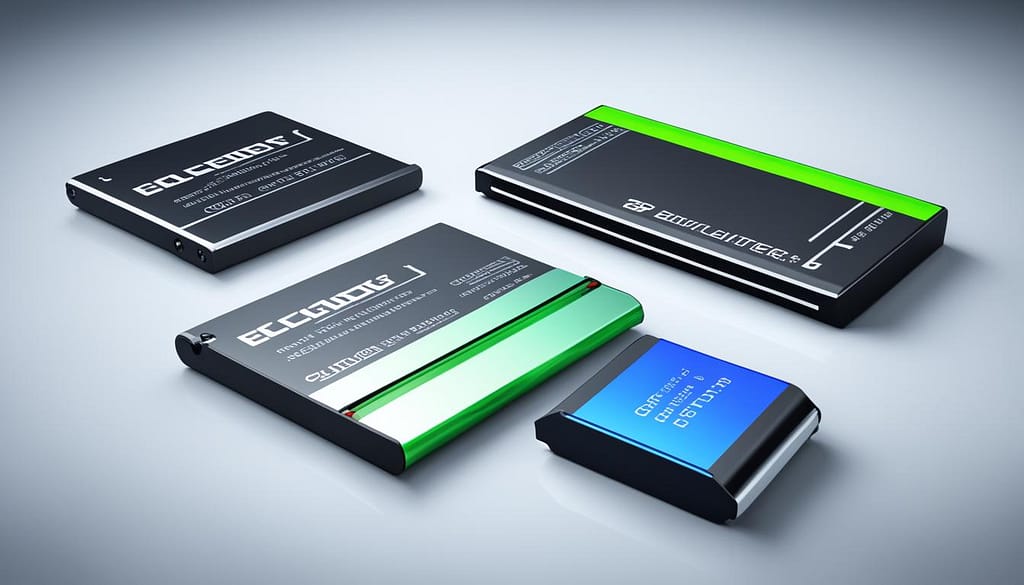Welcome to our comprehensive guide on Lithium Polymer Battery. In this article, we will explore the numerous advantages and uses of these rechargeable batteries. With their high energy density and lightweight design, lithium polymer batteries have become increasingly popular for various applications. So, let’s dive in and discover why they are a top choice for powering your devices.
Key Takeaways:
- Lithium polymer batteries offer a high energy density, providing more power in a compact and lightweight package.
- Their rechargeable capabilities make them a cost-effective and sustainable choice for long-term use.
- With their flexibility and customizable form factor, lithium polymer batteries can be shaped to fit a wide range of devices.
- These batteries have low self-discharge rates, ensuring they retain their charge for extended periods.
- Lithium polymer batteries come with enhanced safety features, including fire resistance and thermal runaway prevention.
Understanding Lithium Polymer Batteries
Lithium polymer batteries are a type of rechargeable battery known for their high energy density and lightweight design. To better understand these batteries, it’s important to explore how they work and what components make up their structure.
How Lithium Polymer Batteries Work
Lithium polymer batteries consist of two electrodes, a positive electrode, and a negative electrode. These electrodes are separated by a thin film of electrolyte, which allows the flow of lithium ions between them. During the charging process, lithium ions move from the positive electrode to the negative electrode. This flow is reversed when the battery is discharged, creating an electrical current that can power various devices.
The movement of lithium ions is what enables the battery to store and release energy efficiently. This electrochemical process is the key mechanism behind the functionality of lithium polymer batteries.

The lightweight design of lithium polymer batteries adds to their appeal, making them ideal for use in portable electronics. Their compact and flexible form factor allows them to be easily incorporated into devices such as smartphones, tablets, and wearable devices without adding significant weight. This attribute is particularly beneficial in applications where portability and weight reduction are crucial factors.
Overall, understanding the inner workings of lithium polymer batteries helps us appreciate their high energy density, lightweight design, and rechargeable capabilities. In the next section, we will delve into the advantages of utilizing this technology in various applications.
The Advantages of Lithium Polymer Battery Technology
Lithium polymer batteries offer multiple advantages that make them the preferred choice for various applications. From their lightweight and customizable form factor to their high energy density and efficient performance, these batteries provide exceptional benefits for powering portable devices.
Lightweight & Customizable Form Factor
One of the key advantages of lithium polymer batteries is their lightweight design. lithium polymer battery consider as a lightweight batteries. Their compact and flexible form factor allows them to be used in a wide range of portable devices, such as smartphones, tablets, and wearable devices. This makes them an ideal choice for applications where weight and size are important considerations.
High Energy Density and Efficiency
Lithium polymer batteries have a high energy density, allowing them to store more energy in a smaller and lighter package compared to other batteries. This high energy density contributes to longer battery life and ensures efficient performance, making lithium polymer batteries an excellent choice for devices that require sustained power over extended periods.
Low Self-Discharge Rates
Another advantage of lithium polymer batteries is their low self-discharge rates. They retain their charge for longer periods, even when not in use. This feature is beneficial for applications where the battery may sit idle for extended periods, as the battery will still have a charge when needed. The low self-discharge rates also contribute to longer shelf life and extended usability.
Enhanced Safety Features
Lithium polymer batteries are designed with enhanced safety features compared to other types of batteries. They are less likely to leak, making them safer for use in various devices. Additionally, they have built-in mechanisms to prevent overheating, fire, and thermal runaway. These safety features make lithium polymer batteries a reliable and secure choice for powering electronic devices.
Flexibility in Design and Application
The flexible nature of lithium polymer batteries allows for design flexibility and versatility in application. Unlike traditional cylindrical batteries, lithium polymer batteries can be shaped to fit the contours of the device they are being used in. This customization capability makes them suitable for a wide range of devices and applications, from smartphones to electric vehicles.
| Advantages | Description |
|---|---|
| Lightweight and Portable | Lithium polymer batteries are lightweight and have a compact form factor, making them suitable as a portable power source. |
| High Energy Density | These batteries have a high energy density, allowing them to store more energy in a smaller and lighter package. |
| Low Self-Discharge Rates | Lithium polymer batteries have low self-discharge rates, retaining their charge for longer periods of time. |
| Enhanced Safety Features | These batteries are designed with safety features to prevent issues such as overheating, fire, and thermal runaway. |
| Flexibility in Design | Lithium polymer batteries can be shaped and customized to fit specific device designs and applications. |
Conclusion
In conclusion, lithium polymer batteries offer numerous advantages over other types of batteries. Their lightweight design and high energy density make them the preferred choice for a wide range of applications, from portable electronics to electric vehicles. The rechargeable capabilities of lithium polymer batteries ensure long-lasting and efficient power.
One of the key factors that set lithium polymer batteries apart is their enhanced safety features. With built-in mechanisms to prevent overheating, fire, and thermal runaway, lithium polymer batteries provide a reliable and secure power source for electronic devices. This makes them a trusted option for both personal and professional use.
Additionally, the flexibility in design of lithium polymer batteries allows for customized shapes, making them suitable for a variety of devices and applications. This versatility, paired with their lightweight nature, further contributes to their popularity in the market.
When it comes to selecting a battery for your device, it is important to consider the advantages that lithium polymer batteries bring to the table. Their lightweight construction, high energy density, rechargeability, safety features, and design flexibility make them the optimal choice for powering your devices with long-lasting and efficient performance.
FAQ
What is a lithium polymer battery?
A lithium polymer battery, also known as a LiPo battery, is a rechargeable battery that offers a high energy density and lightweight design. It is made up of two electrodes, a positive electrode, and a negative electrode, separated by a thin film of electrolyte.
How do lithium polymer batteries work?
During charging, lithium ions flow from the positive electrode to the negative electrode, and during discharge, the process is reversed, creating an electrical current. This movement of lithium ions powers various devices.
What are the advantages of lithium polymer battery technology?
Lithium polymer batteries offer several advantages, including a lightweight and customizable form factor, high energy density and efficiency, low self-discharge rates, enhanced safety features, and flexibility in design and application.
Why are lithium polymer batteries considered lightweight?
Lithium polymer batteries have a compact and flexible form factor, making them light in weight. This makes them an ideal choice for applications where weight and size are important considerations.
What is the significance of high energy density in lithium polymer batteries?
Lithium polymer batteries have a high energy density, meaning they can store more energy in a smaller and lighter package compared to other batteries. This high energy density contributes to longer battery life and ensures efficient performance.
Do lithium polymer batteries have low self-discharge rates?
Yes, lithium polymer batteries have low self-discharge rates. They can retain their charge for longer periods, even when not in use. This makes them perfect for applications where the battery may sit idle for extended periods, as they will still have a charge when needed.
Are lithium polymer batteries safe to use?
Yes, lithium polymer batteries have enhanced safety features compared to other types of batteries. They are less likely to leak and have built-in mechanisms to prevent overheating, fire, and thermal runaway. These safety features make them a reliable and secure choice for powering electronic devices.
Can lithium polymer batteries be customized for different devices?
Yes, lithium polymer batteries can be shaped to fit the contours of the device they are being used in. This flexibility in design allows for versatility in application, making them suitable for a wide range of devices and uses.

